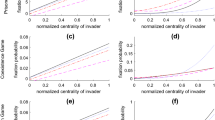Abstract
Recent studies have revealed that graph heterogeneity can considerably affect evolutionary processes and that it promotes the emergence and maintenance of cooperation in social dilemmas. In this paper, we analytically derive the evolutionary dynamics and the evolutionarily stable strategy (ESS) condition for \(2 \times 2\) games on heterogeneous graphs based on “pairwise comparison” updating. Using pair approximation, we introduce a new state variable to measure the evolutionary process. In the limit of weak selection, we show that the evolutionary dynamics can be approximated as a replicator equation with a transformed payoff matrix, and the ESS condition depends on both the mean value and the variance of the degree distribution. These results are subsequently applied to the Prisoner’s Dilemma game and the Stag Hunt game. In both games, we find that the variance plays a determinant role in the evolution of cooperation: Cooperative strategy cannot evolve in regular graphs, but it is favored by natural selection in strongly heterogeneous graphs.



Similar content being viewed by others
References
Albert R, Barabási AL (2002) Statistical mechanics of complex networks. Rev Mod Phys 74:47–98
Albert R, Jeong H, Barabási AL (1999) Internet: diameter of the world-wide web. Nature 401:130–131
Axelord R (1984) The evolution of cooperation. Basic Books, New York
Barabási AL, Albert R (1999) Emergence of scaling in random networks. Science 15:509–512
Bergstrom TC (2003) The algebra of assortative encounters and the evolution of cooperation. Int Game Theory Rev 5:1–18
Dorogotsev SN, Mendes JFF (2003) Evolution of networks: from biological nets to the internet and www. Oxford University Press, Oxford
Hofbauer J, Sigmund K (1998) Evolutionary games and population dynamics. Cambridge University Press, Cambridge
Fu F, Nowak MA, Christakis NA, Fowler JH (2012) The evolution of homophily. Sci Rep 2:00845
Jeong H, Tombor B, Albert R, Ottval ZN, Barabási AL (2000) The large-scale organization of metabolic networks. Nature 407:651–654
Li C, Zhang BY, Cressman R, Tao Y (2013) Evolution of cooperation in a heterogeneous graph: fixation probabilities under weak selection. PLoS One 8:e66560
Maciejewski W, Fu F, Hauert C (2014) Evolutionary game dynamics in populations with heterogenous structures. PLoS Comput Biol 10:e1003567
McPherson M, Smith-Lovin L, Cook JM (2001) Birds of a feather: homophily in social networks. Annu Rev Sociol 27:415–444
Newman MEJ, Strogatz SH, Watts DJ (2001) Random graphs with arbitrary degree distribution and their applications. Phys Rev E 64:026118
Nobari S, Lu XS, Karras P, Bressan S (2011) Fast random graph generation. In: Proceedings of the 14th international conference on extending database technology, pp 331–342
Nowak MA, May R (1992) Evolutionary games and spatial chaos. Nature 359:826–829
Nowak MA (2006) Evolutionary dynamics. Harvard University Press, Cambridge
Ohtsuki H, Hauert C, Lieberman E, Nowak MA (2006) A simple rule for the evolution of cooperation on graphs and social networks. Nature 441:502–505
Ohtsuki H, Nowak MA (2006) The replicator equation on graphs. J Theor Biol 243:68–97
Ohtsuki H, Nowak MA (2008) Evolutionary stability on graphs. J Theor Biol 251:698–707
Perc M, Gómez-Gardeñes J, Szolnoki A, Floría LM, Moreno Y (2013) Evolutionary dynamics of group interactions on structured populations: a review. J R Soc Interface 10:20120997
Pinheiro FL, Santos FC, Pacheco JM (2012) How selection pressure changes the nature of social dilemmas in structured populations. New J Phys 14:073035
Pinheiro FL, Santos FC, Pacheco JM (2012) From local to global dilemmas in social networks. PLoS One 7:e32114
Poncela J, Gómez-Gardeñes J, Floría LM, Moreno Y, Sánchez A (2009) Cooperative scale-free networks despite the presence of defector hubs. Europhys Lett 88:38003
Poncela J, Gómez-Gardeñes J, Moreno Y, Floría LM (2010) Cooperation in the prisoner’s dilemma game in random scale-free graphs. Int J Bifurcat Chaos 20:849–857
Rand DG, Arbesman S, Christakis NA (2011) Dynamic social networks promote cooperation in experiments with humans. Proc Natl Acad Sci USA 108:19193–19198
Roca CP, Cuesta JA, Sánchez A (2009) Evolutionary game theory: temporal and spatial effects beyond replicator dynamics. Phys Life Rev 6:208–249
Santos FC, Pacheco JM, Lenaerts T (2006) Evolutionary dynamics of social dilemmas in the structured heterogeneous populations. Proc Natl Acad Sci USA 103:3490–3494
Santos FC, Santos MD, Pacheco JM (2008) Social diversity promotes the emergence of cooperation in the public goods game. Nature 454:213–216
Santos FC, Pinheiro FL, Lenaerts T, Pacheco JM (2012) The role of diversity in the evolution of cooperation. J Theor Biol 299:88–96
Szabó G, Fáth G (2007) Evolutionary games on graphs. Phys Rep 446:97–216
Szolnoki A, Perc M, Danku Z (2008) Towards effective payoffs in the prisoner’s dilemma game on scale-free networks. Phys A 387:2075–2082
Traulsen A, Claussen JC, Hauert C (2005) Coevolutionary dynamics: from finite to infinite populations. Phys Rev Lett 95:238701
Acknowledgments
This research is supported by the National Natural Science Foundation of China (Nos. 11301032 and 31270439) and “the Fundamental Research Funds for the Central Universities” of China.
Author information
Authors and Affiliations
Corresponding author
Rights and permissions
About this article
Cite this article
Zhang, B., Li, C. & Tao, Y. Evolutionary Stability and the Evolution of Cooperation on Heterogeneous Graphs. Dyn Games Appl 6, 567–579 (2016). https://doi.org/10.1007/s13235-015-0146-2
Published:
Issue Date:
DOI: https://doi.org/10.1007/s13235-015-0146-2




